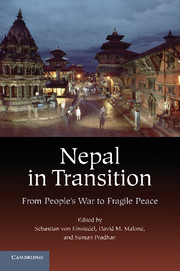Crossref Citations
This Book has been
cited by the following publications. This list is generated based on data provided by Crossref.
Ropers, Norbert
2012.
Insider Mediation as a Tool of Collaborative Security.
International Studies,
Vol. 49,
Issue. 3-4,
p.
189.
Subedi, DB
2014.
Dealing with Ex-Combatants in a Negotiated Peace Process: Impacts of Transitional Politics on the Disarmament, Demobilization and Reintegration Programme in Nepal.
Journal of Asian and African Studies,
Vol. 49,
Issue. 6,
p.
672.
O'Neill, Tom
2016.
Student union ‘political anti-politics’ in post-conflict Nepal.
Journal of Youth Studies,
Vol. 19,
Issue. 8,
p.
1077.
Ojha, Hemant R.
Ghimire, Sharad
Pain, Adam
Nightingale, Andrea
Khatri, Dil B.
and
Dhungana, Hari
2016.
Policy without politics: technocratic control of climate change adaptation policy making in Nepal.
Climate Policy,
Vol. 16,
Issue. 4,
p.
415.
SHNEIDERMAN, SARA
WAGNER, LUKE
RINCK, JACOB
JOHNSON, AMY L.
and
LORD, AUSTIN
2016.
Nepal's Ongoing Political Transformation: A review of post-2006 literature on conflict, the state, identities, and environments.
Modern Asian Studies,
Vol. 50,
Issue. 6,
p.
2041.
Lord, Austin
2016.
Citizens of a hydropower nation: Territory and agency at the frontiers of hydropower development in Nepal.
Economic Anthropology,
Vol. 3,
Issue. 1,
p.
145.
Byrne, Sarah
Nightingale, Andrea J.
and
Korf, Benedikt
2016.
Making Territory: War, Post‐war and the Entangled Scales of Contested Forest Governance in Mid‐Western Nepal.
Development and Change,
Vol. 47,
Issue. 6,
p.
1269.
Richardson, Diane
Laurie, Nina
Poudel, Meena
and
Townsend, Janet
2016.
Women and Citizenship Post-Trafficking: The Case of Nepal.
The Sociological Review,
Vol. 64,
Issue. 2,
p.
329.
Wittels, Stephen
2017.
The Virtues of Nonviolent Struggle.
SSRN Electronic Journal,
Khanal, Peshal
2017.
Falling prey to the dominant culture? Demystifying symbolic violence against ethnic minority students in Nepal.
Pedagogy, Culture & Society,
Vol. 25,
Issue. 3,
p.
457.
Byrne, Sarah
Nightingale, Andrea J.
and
Korf, Benedikt
2017.
Rule and Rupture.
p.
71.
Natarajan, Sukanya
2017.
Intercultural Relations and Ethnic Conflict in Asia.
p.
137.
Ghimire, Safal
2017.
Optimised or compromised? United Kingdom support to reforming security sector governance in post-war Nepal.
Third World Quarterly,
Vol. 38,
Issue. 6,
p.
1415.
Kruhl, Jörn H.
Adhikari, Rameshwar
and
Dorka, Uwe E.
2018.
Living Under the Threat of Earthquakes.
p.
1.
Lundqvist, Martin Ola
and
Öjendal, Joakim
2018.
Atomised and Subordinated? Unpacking the role of International Involvement in ‘The Local turn’ of Peacebuilding in Nepal and Cambodia.
Journal of Peacebuilding & Development,
Vol. 13,
Issue. 2,
p.
16.
Shrestha, Bahul
and
Pathranarakul, Pairote
2018.
Nepal Government’s Emergency Response to the 2015 Earthquake: A Case Study.
Social Sciences,
Vol. 7,
Issue. 8,
p.
127.
Day, Adam
2019.
United Nations Peace Operations in a Changing Global Order.
p.
67.
Riley, Heidi
2019.
Male collective identity in the People’s Liberation Army of Nepal.
International Feminist Journal of Politics,
Vol. 21,
Issue. 4,
p.
544.
Lundqvist, Martin
2019.
Post-war memorialisation as everyday peace? Exploring everyday (dis-) engagements with the Maoist martyrs’ gate of Beni Bazaar in Nepal.
Conflict, Security & Development,
Vol. 19,
Issue. 5,
p.
475.
Richardson, Diane
and
Laurie, Nina
2019.
Returning to sexual stigma: post‐trafficking lives.
The British Journal of Sociology,
Vol. 70,
Issue. 5,
p.
1926.



